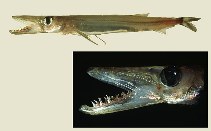| Family: |
Paralepididae (Barracudinas) |
| Max. size: |
100 cm TL (male/unsexed) |
| Environment: |
bathypelagic; marine; depth range 200 - 2000 m |
| Distribution: |
Circumglobal, broadly distributed, from 50°N to 40°S. |
| Diagnosis: |
Dorsal spines (total): 0-0; Dorsal soft rays (total): 12-16; Anal spines: 0-0; Anal soft rays: 21-24. Color: silvery pink; tip of lower jaw distinctly curved up; large teeth in lower jaw; gill rakers tooth-like, on bony base (Ref. 232). |
| Biology: |
Mesopelagic to bathypelagic. Carnivorous. Probably spawns near the surface in temperate to tropical waters (Ref. 5759). Has been supposed to be one of the 'cable-biters'; reconstructions from big teeth found in submarine cables suggests that it attains at least 100 cm body-length (Ref. 4474). |
| IUCN Red List Status: |
Data deficient (DD); Date assessed: 16 January 2013 Ref. (130435)
|
| Threat to humans: |
harmless |
Source and more info: www.fishbase.org. For personal, classroom, and other internal use only. Not for publication.

